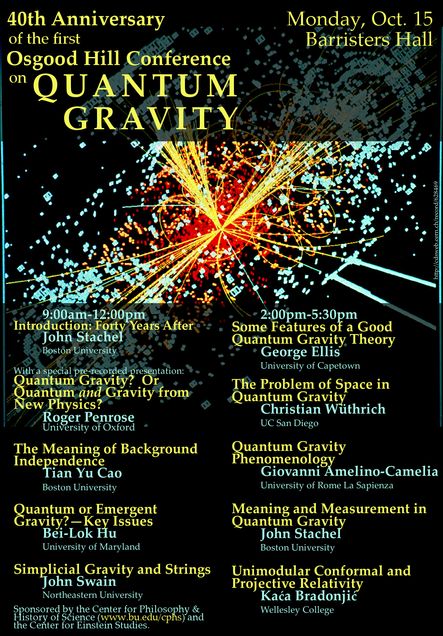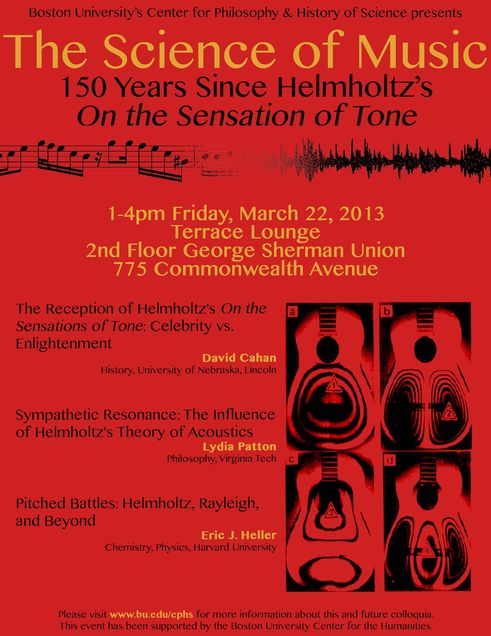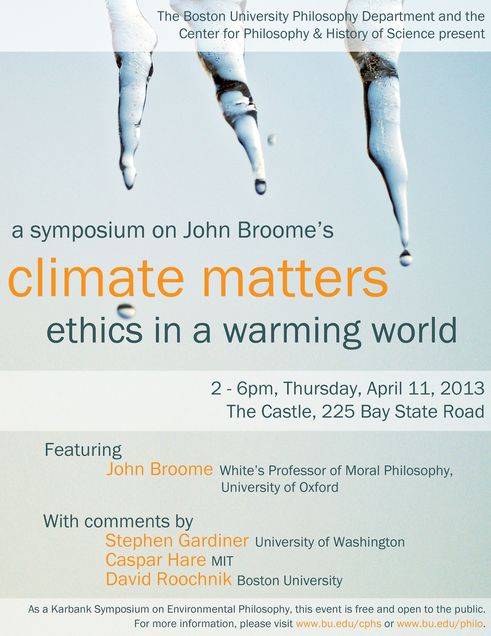Archives: 2012–2013
Boston Colloquium for Philosophy of Science
53rd Annual Program
Download the 53rd Annual Program
- October 15th, 2012 | 40th Anniversary of the First Osgood Hill Conference on Quantum Gravity
- November 11-12th, 2012 | Turing 100
- December 7th, 2012 | How Can the History and Philosophy of Science Contribute to Contemporary U.S. Science Education?
- March 22nd, 2013 | The Robert S. Cohen Forum: The Science of Music: 150 Years Since Helmholtz’s On the Sensations of Tone
- April 11, 2013 | The Karbank Symposium in Environmental Philosophy: A Symposium on John Broome’s Climate Matters: Ethics in a Warming World
- April 29, 2013 | The Alfred I. Tauber Forum: Stereotype Threat: Philosophy, Psychology, and the Self
40th Anniversary of the First Osgood Hill Conference on Quantum Gravity
Co-sponsored by the Center for Einstein Studies
Monday, October 15
9:00am-5:30pm
Barristers Hall, Law School
765 Commonwealth Ave.
Morning Session, 9:00am-12:00pm
-
Introduction: Forty Years After
John Stachel Center for Einstein Studies, Boston University
-
With a special pre-recorded presentation:
Quantum Gravity? Or Quantum and Gravity from New Physics?Roger Penrose Mathematical Institute, University of Oxford
-
The Meaning of Background Independence
Tian Yu Cao Philosophy, Boston University
-
Quantum or Emergent Gravity?—Key Issues
Bei-Lok Hu Physics, University of Maryland
-
Simplicial Gravity and Strings
John Swain Physics, Northeastern University
Afternoon Session, 2:00pm-5:30pm
-
Some Features of a Good Quantum Gravity Theory
George Ellis Mathematics, University of Capetown
-
The Problem of Space in Quantum Gravity
Christian Wüthrich Philosophy, Science Studies, UC San Diego
-
Quantum Gravity Phenomenology
Giovanni Amelino-Camelia Physics, University of Rome La Sapienza
-
Meaning and Measurement in Quantum Gravity
John Stachel Center for Einstein Studies, Boston University
-
Unimodular Conformal and Projective Relativity
Kaća Bradonjić Physics, Wellesley College
Turing 100
Sunday, November 11, 10:00am-6:00pm
and Monday, November 12, 9:30am-6:30pm
Photonics Center
9th floor Colloquium Room (906)
8 St. Mary’s Street
I. Turing’s Philosophical and Logical Foundations
Sunday, November 11, 10:00am- Noon
-
On Formalism Freeness: A Meditation on Gödel’s 1946 Princeton Bicentennial Lecture
Juliette Kennedy Mathematics and Statistics, University of Helsinki
-
Turing, Church, Gödel, a personal perspective
Michael Rabin Computer Science, Harvard University
-
Turing and Wittgenstein
Juliet Floyd Philosophy, Boston University
II. Turing and Mathematics: Computability and Definability
Sunday, November 11, 1:45pm-3:45pm
-
Universality is Ubiquitous
Martin Davis Courant Institute, NYU; Mathematics, UC Berkeley
-
Collapsing Sentences
Gerald Sacks Mathematics, Harvard University and MIT
-
The Hierarchy of Definability: An Extended Thesis
Theodore Slaman Mathematics, UC Berkeley
III. Turing and Cryptography
Sunday, November 11, 4:00pm-6:00pm
-
Rational Proofs
Silvio Micali Computer Science, MIT
-
Turing and the Growth of Cryptography
Ronald Rivest Computer Science, MIT
-
Alan Turing and Voice Encryption
Craig Bauer Mathematics, York College of Pennsylvania
IV. Turing and Artificial Intelligence
Monday, November 12, 9:30am-12:15pm
-
Title TBA
Marvin Minsky Media Arts and Sciences, MIT
-
Why Neanderthals Couldn’t Pass Turing’s Test and When Computers Will
Patrick Henry Winston Computer Science, MIT
-
Embodying Computation at Higher Types
S. Barry Cooper Mathematics, University of Leeds
V. The Church-Turing Thesis
Monday, November 12, 2:00pm-4:00pm
-
Normal Forms for Puzzles: an Enigmatic Variant of Turing’s Thesis
Wilfrid Sieg Philosophy, Carnegie Mellon University
-
Exploring the Computational Universe
Stephen Wolfram Wolfram Research
-
Is there a Church-Turing Thesis for Social Algorithms?
Rohit Parikh Computer Science, Mathematics, Philosophy, CUNY
VI. Turing, Physics, and Probability
Monday, November 12, 4:15pm-6:30pm
-
Algorithmic Randomness and Turing’s Work on Normality
Rod Downey Mathematics, Victoria University of Wellington
-
Spacetime Physics and Non-Turing Computers
Mark Hogarth Philosophy, Cambridge University
-
The Mysterious Thesis
Leonid Levin Computer Science, Boston University
Organized in collaboration with the Department of Computer Science and the Rafik B. Hariri Institute for Computing and Computational Science & Engineering. Financial support has been provided by the Hariri Institute.
Updates about the conference and more information about Alan Turing will be posted on the conference website, hosted by the Hariri Institute.
How Can the History and Philosophy of Science Contribute to Contemporary U.S. Science Education?
Friday, December 7, 2012
9:00am-6:00pm
Photonics Center, 9th Floor Colloquium Room
8 St. Mary’s Street, Room 906
Introductory Comments
Panel I: History of HPS in Science Education
9:00am–10:10am
-
The Neglected Mandate: Teaching Science as Part of our Culture
Gerald Holton Harvard University
-
HPS & ST: Looking Back and Going Forward
Michael Matthews University of New South Wales
Panel Participants: Sevan Terzian University of Florida; David Rudge Western Michigan University
Panel II: HPS and the Science Frameworks
10:15am–11:25am
-
Framing the Learning/Teaching of Science and Nature of Science: Practices-Core Ideas-Crosscutting Concepts
Richard Duschl NSF
-
Philosophy of Science and Science Education Reform
Gregory Kelly Penn State
Panel Participants: Michael Ford University of Pittsburgh; Jacob Foster Mass DOE; Katherine McNeill Boston College
Panel III: Teaching and Learning with HPS I: Outcomes for Teachers and Students
11:30am–12:40pm
-
What History Teaches Us About Using History of Science to Teach About Nature of Science
Fouad Abd-El-Khalick University of Illinois at Urbana-Champaign
-
Science With a Background
Fanny Seroglou Aristotle University of Thessaloniki
Panel Participants: Katherine Brading University of Notre Dame; Ricardo Lopes Coelho University of Lisbon
Lunch: Plenary Speaker
12:45pm–2:00pm
Barrister’s Hall — Invitees only
-
On the importance of defining before maligning: a case study from early science education
David Klahr Carnegie Mellon University
Panel IV: Teaching and Learning with HPS II: Outcomes for Teachers and Students
2:15pm–3:25pm
-
Using the History of Scientists to Inspire or Motivate STEM Learning
Xiaodong Lin-Siegler Columbia University
-
HPS from the Teacher’s Perspective: Three Approaches to Teaching the Nature of Science
Douglas Allchin University of Minnesota
Panel Participants: Frank Keil Yale University; Michael Clough Iowa State
Panel V: Using HPS in the Classroom: Ethical Reasoning and Modeling
3:30pm–4:05pm
-
Integrating Bioethics into Secondary Science Education: Content, Pedagogy and Lessons Learned
Mildred Solomon The Hastings Center
-
Patterns of Cognitive Engagement that Interact with the Nature of Science to Complicate Public Understanding of Complexity and Scientific Research
Tina Grotzer Harvard University
Panel Participants: Jeanne Chowning Northwest Association for Biomedical Research
Panel VI: HPS in K-12 Professional Development
4:45pm–5:55pm
-
History of Science in the Classroom – a Story of Obstacles to Overcome
Dietmar Höttecke Universität Hamburg
-
Assessing the Impact of a Historically Based Unit on Preservice Teachers’ Views of the Nature of Science
David Rudge Western Michigan University
Panel Participants: John Clement University of Massachusetts Amherst; Barbara Crawford University of Georgia
Co-sponsored by the Boston University School of Education. We gratefully acknowledge the support of a REESE grant from the National Science Foundation.
More information, including a list of speakers and their profiles, is available at the conference website ( http://www.bu.edu/hps-scied/).
The Robert S. Cohen Forum: Contemporary Issues in Science Studies
The Science of Music: 150 Years Since Helmholtz’s On the Sensations of Tone
Friday, March 22, 2013
1:00-5:00 pm
Terrace Lounge, 2nd Floor, George Sherman Union
775 Commonwealth Avenue
The Reception of Helmholtz’s On the Sensations of Tone: Celebrity vs. Enlightenment
David Cahan History, University of Nebraska, Lincoln
Sympathetic Resonance: The Influence of Helmholtz’s Theory of Acoustics
Lydia Patton Philosophy, Virginia Tech
Pitched Battles: Helmholtz, Rayleigh, and Beyond
Eric J. Heller Chemistry, Physics, Harvard University
Musical Illusions, Perfect Pitch, and Other Mysteries
Diana Deutsch Psychology, UC San Diego
We gratefully acknowledge the support of the Boston University Center for the Humanities.
The Karbank Symposium in Environmental Philosophy
A Symposium on John Broome’s Climate Matters: Ethics in a Warming World
Thursday, April 11, 2013
2:00pm-6:00pm
The Castle, 225 Bay State Road
John Broome White’s Professor of Moral Philosophy, University of Oxford
Commentators:
Stephen Gardiner University of Washington
Caspar Hare MIT
David Roochnik Boston University
The Alfred I. Tauber Forum
Stereotype Threat: Philosophy, Psychology, and the Self
Monday, April 29, 2013
1:00-6:00pm
Terrace Lounge, 2nd Floor, George Sherman Union
775 Commonwealth Avenue
Stereotype Threat: What It Is, How It Affects Students’ Achievement Over Time, and How to Fix It
Greg Walton Psychology, Stanford University
Stereotype Threat: Implications for the Assessment of Merit and for Affirmative Action
Steven Spencer Psychology, University of Waterloo
Why Are There So Few Women in Philosophy?
Louise Antony Philosophy, University of Massachusetts, Amherst
Stereotype Threat and Intentional Performance
Ron Mallon Philosophy, Washington University, St. Louis
Using Knowledge: Philosophical and Psychological Perspectives on Stereotype Threat
Tamar Gendler Philosophy, Yale University
mp3 (Note: first few seconds missing)
We gratefully acknowledge the support of the Boston University Center for the Humanities.









